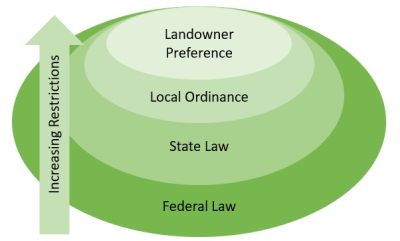Wildlife Control Laws and Regulations
Disclaimer: The information provided here is for historical research purposes only. It does not constitute legal advice. Laws change, sometimes frequently so we cannot guarantee that the information provided here is still current. Always consult a qualified attorney or government officials before initiating any wildlife control program.
Wildlife law is complicated:
- All the legal issues have not been completely worked out yet or settled in case law. For example, in recent years, laws related to the treatment of domestic animals like pets have been used to prosecute individuals working with wildlife. Historically, cruelty standards for domestic animals have been set much lower than those set for wildlife. However, those who support animal rights have been actively seeking to have laws governing the treatment of domestic animals be applied to the treatment of wildlife.
- The law is a reflection of public opinion. As public opinion is changing and becoming more animal rights friendly, laws governing the treatment of wildlife have become more restrictive. Thus this area of the law is presently in flux.
- The laws are also complicated because different agencies, with different guidelines, believe they have jurisdiction over the treatment of animals. So it is potentially possible to be following the regulations of one agency only to be prosecuted, fined, etc., by another.
Hierarchy of Legal Rules Related to Wildlife

This diagram shows how wildlife laws cascade in the U.S. legal system. Rules can only be more restrictive as you move from federal to state to local, they can never be less restrictive.
Federal Wildlife Laws & Regulations
U.S. Federal Regulations Search Engine
National Pesticide Information Center
Federal Migratory Bird Treaty Act
State Wildlife Laws and Regulations
For information on individual states, search for individual state wildlife agencies.